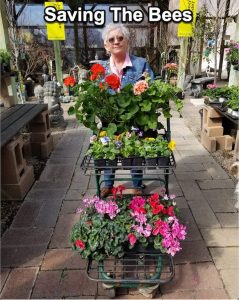
I am a full fledged nursery hound. It gives me great pleasure to walk up one aisle of brilliant color and down the other with my little dog Lillian. People are always in a good mood in the plants department. They bend down and pet Lillian and make a fuss over her while we exchange small talk and everyone feels better.
So I was extremely concerned when I learned that there was a lot of buzz in recent years about a group of chemicals known as neonicotinoids. Nursery plants are often treated with the pesticide neonicotinoids. You might first think, “What could be the big harm? I not going to eat my flowers.” But here’s the BIG PROBLEM. Bees are the ones at risk. Neonicos infect a plant through its entire system, including the nectar and pollen. They harm bees as they go about their job of pollinating. These pesticides affect the general nervous system of the bees. New studies say neonicos do not obliterate bee colonies outright, but instead kill them over extended periods of time. The pesticide also threatens the bee queen in particular…..which means colonies have lower reproductive rates.
People who love plants tend to love “the birds and the bees, the flowers and the trees and the moon up above” and the last thing we want to contribute to is colony collapse. If anything I’m a bee lover and activist. I am very clear that a world without bee pollinators would wipe out:
apples, cucumbers, avocados, cherries, onions, almonds, grapefruit, blueberries, oranges, pumpkins, kiwi, plums, guava, nectarines, pears, okra, apricots, coffee, macadamia nuts, lemons, figs, limes, watermelon, beets, cauliflower, raspberries, cacao, vanilla, tomatoes, grapes…….
BECOME A BEE ACTIVIST
One of the best ways for home gardeners to know whether ornamental plants they purchase at retail garden centers or big box stores have been treated with neonicotinoids is ask the staff or look at the plant label, that little plastic pop up tab.
Home Depot is required to have a label in each pot of plants treated with a neonicotinoid insecticide. The store says it plans to phase out the use of neonics by the end of 2018. It will be up to us to watch dog each plant we buy.
Lowes says it is eliminating the use of neonics on quotes “plants that attract bees” by 2019, and make brochures and fact sheets about pollinator health available in stores.
That’s some good news sorta, but 2019 seems a little far away in the life of a bee.
But if I’m hip to something that is important, I’ll be on the double alert. On my tippy toes checking all the labels like I’m in the grocery store. I’m letting you know about it so you can spread the word to other plant lovers. Together we can do our part to save the honey bee, bumble bee and each wild bee. Save our food supply and our planet.
WHAT’S GOING ON AT DIET FOR LIVING SCHOOL?
We are going through a growth spurt. You asked us and we heard. All our classes in the future will become 100% online so that more of our followers can access our training. You will be able to access our exciting Programs from the comfort of your own home at your own pace. YAY!!!! We will be rolling out the new schedule late spring.
So Get Ready! Check out our Programs here: http://bit.ly/ DFLS_Health_Coach
Check out what our graduates have to say about our Programs here: http://bit.ly/ DFLS_Testimonials
Sign-up for our newsletter here: http://bit.ly/ DFLS_NEWSLETTER
Keep up with the latest in Health and Wellness News, our Programs and our promotions.
Make a difference in your life and in the lives of others!
You can reach us at: 505.243.1157 or email us at
dietforlivingschool@gmail. com
Please share us with friends and family.